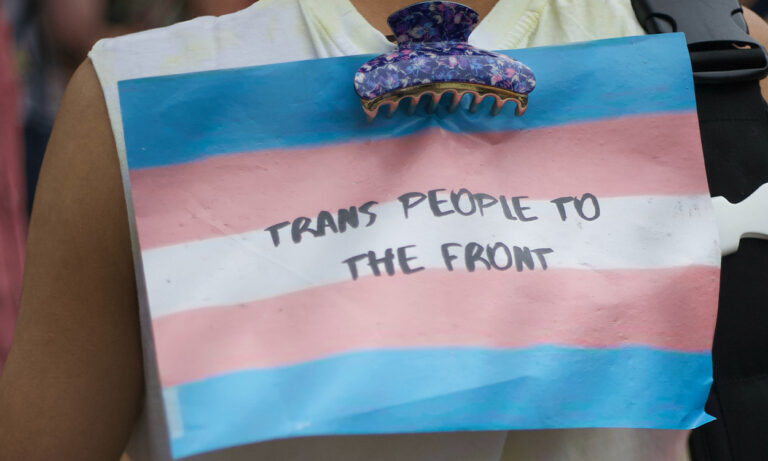The UK’s decision to block the Scottish Gender Recognition Reform bill is indicative of a corrupt system
The Scottish Gender Recognition Reform bill spent three long days being debated in the Scottish Parliament and an additional six long years being argued over elsewhere. On 22 December 2022, it finally passed with a supermajority of 88 to 33 votes, only to quickly prompt what many have described as an attack on the country’s democracy by the unelected UK Prime Minister, Rishi Sunak.
The UK’s recent Census 2021 data showed that trans people (at least those of us willing to be identified to this government as trans people) are a tiny minority of the population. Despite that, reform pertaining to a law that concerns our birth certificates has become controversial for many—particularly, as is always the case, those outside of the LGBTQIA+ community.
Understandably, when moving from ‘trans people’s birth certificates’ to ‘the collapse of the United Kingdom at the hands of an unelected Prime Minister’, it can be difficult to see exactly how we got here. Truth be told, even I’m a little bit lost for words and that’s bad news for me: a writer.
First Minister of Scotland Nicola Sturgeon has stated that there are no grounds for the UK to take what many are describing as the “nuclear option”—with the bill having been specifically designed knowing that the UK would attempt to block it if it did overstep into a reserved matter, such as equality law.
The UK quite famously ignored the results of its own Gender Recognition Act (GRA) reform consultation and backpedalled on promises made under former Prime Minister Theresa May to bring in self-ID South of Scotland. So Scottish politicians were very careful about what they could and could not do with their reform, and across three days in Holyrood, we heard them give evidence to that fact.
The proposed reforms do not alter the GRA itself, they merely alter the process for applying for it—a task which currently requires a medical diagnosis that can be hard to get due to NHS waitlists which have a tendency to span decades at a time. The most prominent feature of these reforms is removing this requirement for medical diagnosis.
The UK government recently threatened to trigger the section 35 order as part of the Scotland act which, in short, gives the UK the right to veto legislation passed in the Scottish Parliament if it’s incompatible with the UK’s international obligations or if it adversely affects how UK law operates. It has now been confirmed that Sunak and Alister Jack, British Secretary of State for Scotland, have laid down section 35—thereby blocking the bill.
The UK government has made specific mention of the alleged conflict between the Equality Act and a sprinkling of fear-mongering surrounding the idea of fraudulent Gender Recognition Certificate (GRC) applications. This was an issue that opposition to the bill pushed hard during debate in Holyrood, but failed to secure amendments supporting their claims.
This is consistent with moves made by Equalities Minister Kemi Badenoch, who recently announced her Government Equalities Office would be looking into whether it would accept birth certificates from other countries that use a self-ID system, such as the Republic of Ireland—with the aim being to force those trans people to reapply through the UK system if they move here.
It should be highlighted that it isn’t particularly clear how Badenoch intends to tell which foreign birth certificates belong to transgender people or not. Trans birth certificates usually look identical to every other birth certificate, and without other governments providing the UK with a record of change, there is no actual way to tell. And why would they help the British government after it has called into question their legitimacy on this issue?
A quick reminder: this is the same UK government (a few have swapped seats, but it’s mostly the same people at the top) who only last year had their international LGBTQIA+ conference collapse. The intention behind the #SafeToBeMe conference was to highlight how progressive and forward-thinking the country was in regard to LGBTQIA+ rights. Instead, over 100 groups within the community pulled out after the government retracted its promise to ban conversion therapy.
A trans-inclusive ban has since been announced but it’s all a little bit too late, isn’t it? Hate crimes against LGBTQIA+ people are still rising consistently with each passing year, sometimes by upwards of 80 per cent. The media is still pumping out thousands of fear-mongering articles and commentary pieces filled with misinformation. And the government is still obsessed with pandering to those afraid of what’s written on less than 1 per cent of the population’s birth certificates.
I expect Scotland is going to win this fight. Honestly, it’s shocking to me that lawyers have even advised Sunak and Jack to push forward with the move given that they are risking an already fraught union with Scotland and the rest of the UK, just to maintain control over an aspect of the lives of such a tiny percentage of the population. The arguments for doing so, as provided by the UK government, don’t hold up either given that tax, pensions and pay are all supposedly equal between the sexes anyway.
None of this is real and instead amounts to just another example of performative outrage created to pander to and rile up a highly bigoted audience. They want to be angry and oppose trans people so they will, even if they don’t have a good reason to.
If Scotland ends up independent because of all of this, good for them—I am happy for anyone who can put distance between themselves and the current UK government. I only wish I could join them.





